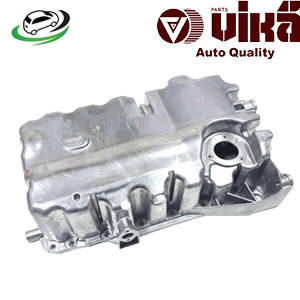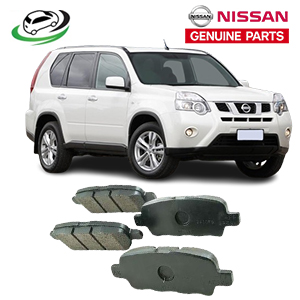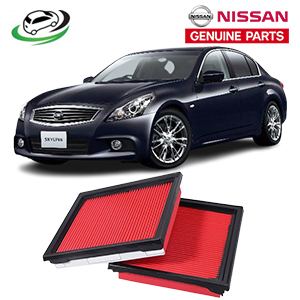-11%
Get Nissan Skyline V36 Genuine Air Filter 16546JK20A
The air filter is a vital component of an internal combustion engine, designed to ensure the engine receives a steady supply of clean air. A genuine air filter refers to an air filter that is either produced by or meets the specifications of the original equipment manufacturer (OEM). This type of air filter is built to provide optimal performance, durability, and fitment for a specific vehicle model. Understanding the function, benefits, signs of wear, and maintenance of a genuine air filter is crucial for maintaining engine efficiency and longevity.
Function of the Air Filter
The primary function of the air filter is to clean the air that enters the engine’s intake system. Engines require a precise mixture of air and fuel for combustion, and the air entering the engine must be free of contaminants to avoid engine wear or performance degradation. The air filter serves multiple purposes:
- Filtering Out Contaminants:
- The main role of the air filter is to trap dust, dirt, debris, pollen, and other airborne particles that could otherwise enter the engine. Even tiny particles can cause significant damage to the engine’s internal components, such as the pistons, valves, and cylinders.
- Optimizing Airflow:
- A genuine air filter is designed to balance filtration and airflow. While the filter blocks harmful contaminants, it also ensures that a sufficient amount of air reaches the engine for optimal combustion. If an air filter is too restrictive, it can reduce airflow, leading to poor engine performance. Conversely, if it doesn’t filter well, contaminants can enter the engine and cause damage.
- Supporting Fuel Combustion:
- Air filters help the engine achieve the correct air-to-fuel ratio, which is essential for efficient combustion. The engine’s control system uses sensors to monitor the air entering the system, adjusting the fuel supply accordingly. A clean and properly functioning air filter allows the engine to run efficiently, reducing fuel consumption and emissions.
- Protecting the Engine:
- In addition to preventing contaminants from entering the engine, the air filter plays a protective role by preventing small particles from accumulating on engine components such as the throttle body, mass airflow sensor, and turbocharger (if equipped). This protection prolongs the life of the engine and its associated systems.
Types of Air Filters
While air filters may come in various materials and designs, genuine air filters are typically categorized into two main types based on their construction:
- Paper Air Filters:
- Most OEM air filters are made of pleated paper or fiber. These filters offer excellent filtration efficiency, trapping small particles without significantly restricting airflow. Paper filters are typically disposable, and once they become clogged with debris, they must be replaced.
- Foam Air Filters:
- Some OEM filters use foam materials, particularly in performance vehicles or motorcycles. Foam filters can be washed and reused in some cases, but they may require more frequent cleaning than paper filters. These filters are usually oiled to increase their filtration efficiency by trapping particles in the foam.
- Cotton Gauze Air Filters:
- Cotton gauze filters are found in some high-performance vehicles. They provide excellent airflow and are reusable after cleaning and re-oiling. Although not as common in OEM applications as paper filters, they are still considered genuine air filters if designed by the vehicle manufacturer for specific models.
Benefits of Using a Genuine Air Filter
There are numerous benefits to using a genuine air filter, compared to aftermarket alternatives or low-quality filters.
- Optimal Filtration:
- Genuine air filters are designed to meet or exceed OEM specifications, ensuring they effectively filter out harmful contaminants from the air entering the engine. This reduces the likelihood of premature engine wear, ensuring longevity and smooth operation of the engine.
- Perfect Fit:
- Since genuine air filters are designed specifically for the make and model of your vehicle, they provide a perfect fit within the air intake system. A poorly fitting filter can allow unfiltered air to bypass the filter, entering the engine and causing damage. Genuine filters are engineered to seal correctly and prevent leaks.
- Maintaining Warranty and Vehicle Health:
- Using a non-genuine or substandard air filter may void the vehicle’s warranty. Manufacturers typically recommend using OEM parts, and failure to do so could result in the denial of warranty claims for engine damage. Using a genuine air filter ensures that your vehicle remains in compliance with manufacturer requirements.
- Improved Fuel Efficiency:
- A clean and properly functioning air filter allows the engine to breathe easily, which can improve fuel efficiency. A clogged or restrictive air filter can cause the engine to work harder, resulting in increased fuel consumption. Genuine air filters maintain the balance between filtration and airflow, contributing to better fuel economy.
- Prolonged Engine Life:
- By keeping the engine free from contaminants, a genuine air filter helps prevent wear and tear on internal engine components. Over time, dirt and debris can cause scoring and abrasion in the engine, leading to costly repairs. Regularly replacing or maintaining a genuine air filter can extend the life of the engine.
- Lower Emissions:
- An engine that receives clean air is able to burn fuel more efficiently, which reduces the amount of harmful emissions released into the environment. A clogged or dirty air filter can lead to incomplete combustion, producing higher levels of carbon monoxide and hydrocarbons. Genuine air filters help ensure the engine operates cleanly and efficiently.
- Engine Performance and Power:
- A well-functioning air filter helps the engine maintain its performance. In high-performance vehicles, even slight restrictions in airflow can reduce horsepower and torque. Genuine air filters are optimized for airflow, ensuring the engine can perform at its best.
Signs of a Clogged or Worn-Out Air Filter
Over time, air filters become dirty and lose their effectiveness. Here are some common signs that an air filter needs to be replaced:
- Reduced Engine Performance:
- A dirty or clogged air filter can restrict airflow to the engine, leading to reduced acceleration, sluggish throttle response, or overall poor engine performance. If you notice a decrease in engine power, it may be due to a clogged air filter.
- Decreased Fuel Efficiency:
- If the engine is not receiving enough air, it will compensate by burning more fuel. A sudden drop in fuel economy may indicate that the air filter is restricting airflow, causing the engine to consume more fuel than necessary.
- Black Smoke from the Exhaust:
- In some cases, a clogged air filter can lead to incomplete combustion, which results in unburned fuel exiting through the exhaust system. This can cause black smoke to appear from the tailpipe, a sign that the engine is running rich due to restricted airflow.
- Unusual Engine Sounds:
- A restricted air filter can cause the engine to make unusual noises, such as coughing or sputtering. The engine may sound as if it is struggling to breathe, especially when accelerating. These sounds could be a result of an insufficient air supply.
- Check Engine Light:
- In modern vehicles, the engine control unit (ECU) monitors the air intake system. If the air filter becomes excessively dirty or clogged, it may trigger the check engine light. A diagnostic scan can confirm whether the air filter is causing the issue.
- Dirty or Discolored Filter:
- Visually inspecting the air filter is one of the simplest ways to determine its condition. If the filter appears dirty, clogged with debris, or discolored, it is time for a replacement.
Maintenance and Replacement of a Genuine Air Filter
Maintaining a genuine air filter is critical for ensuring the engine performs optimally. Here are some key maintenance tips:
- Regular Inspection:
- It is recommended to inspect the air filter during routine maintenance, such as oil changes or vehicle services. Checking the air filter at least once every 12,000 to 15,000 miles (or as specified in the vehicle’s manual) will help prevent issues.
- Timely Replacement:
- Air filters should be replaced according to the manufacturer’s recommendations. For most vehicles, this means every 12,000 to 30,000 miles, depending on driving conditions. In dusty or off-road environments, more frequent replacements may be necessary.
- Use of Genuine Parts:
- Always use a genuine air filter that is designed for your specific vehicle model. While aftermarket filters may be cheaper, they may not offer the same filtration efficiency or fit as genuine filters. Using genuine parts ensures compatibility and performance.
- Avoiding Over-Cleaning:
- Some air filters, particularly cotton or foam filters, are reusable and can be cleaned. However, over-cleaning can damage the filter material, reducing its effectiveness. Always follow the manufacturer’s instructions for cleaning reusable filters.
- Regular Engine Servicing:
- In addition to maintaining the air filter, regular engine servicing ensures that other components, such as the mass airflow sensor and throttle body, are functioning properly. These components rely on clean air for accurate readings and efficient operation.
Conclusion
The genuine air filter is a critical component that plays a significant role in engine performance, fuel efficiency, and longevity. Its ability to trap contaminants, optimize airflow, and protect engine components ensures the vehicle operates smoothly and efficiently. By understanding the function, benefits, signs of wear, and maintenance tips for genuine air filters, vehicle owners can help prolong their engine’s life, improve performance, and reduce emissions. Regular maintenance and timely replacement of the air filter are essential to keeping the engine running at its best.
Follow us on Facebook for more parts.




Reviews
Clear filtersThere are no reviews yet.